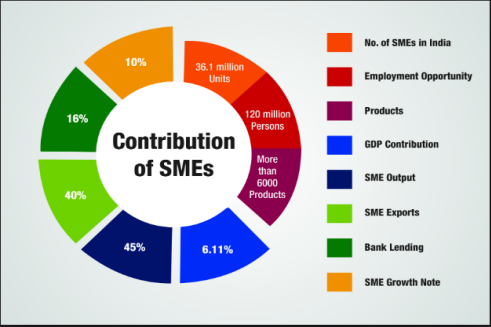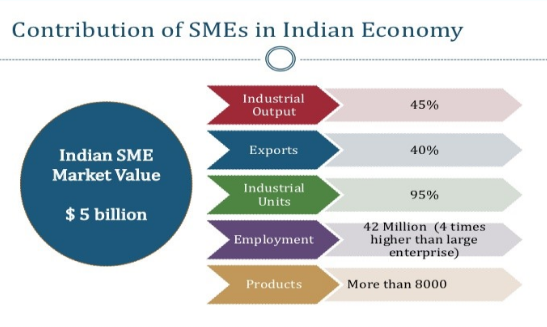Brief Overview for BEE- Small Medium Enterprises Programme till Year 2022-23
Initiatives for Small Medium Enterprises
Objective of BEE – SME Programme
The objective of the scheme is to enhanced energy efficiency in India, accelerate adoption of energy efficiency measures and technologies to conserve energy in MSME sectors. Strengthen the MSMEs with appropriate hand-holding services by knowledge sharing, capacity building, demonstrations of efficient technologies and measures and, suitable financial mechanisms
Implementation of BEE – SME Programme to Promote Energy Efficiency –
Following activities were undertaken to encourage efficient energy consumption in the Micro Small and Medium Enterprises (MSMEs) in India are –
- Energy Use and Technology Analysis
- Capacity building and Outreach awareness
- Implementation of EE measures
- Development of Innovative Financing Mechanisms
Programmatic interventions in the energy efficiency domain
To proclaim the energy efficiency potential, the Indian government has undertaken several policies, strategies and programs targeted at promoting energy efficiency in the MSME sector at the national level. Various programme/schemes of Govt. of India and BEE remain a key driving force of energy conservation/uptake of energy efficiency among the SMEs.
In its endeavour to accelerate the uptake of energy efficiency in the MSME sector, BEE initiated an SME programme in the year 2009 with the objective to improve the energy performance of the MSME sector.
PROGRAM:
BEE – SME Program National Program for EE in SMEs
ACHIEVEMENTS:
- Technology gap assessment study in 35 energy intensive clusters
- Preparation of 400 Technology specific bankable DPRs
- Energy efficient technologies demo projects in 21 units of 4 selected clusters
- More than 100 Capacity building cum Knowledge dissemination programme was organized
- Identification of more than 70 local service providers for supplies of EE technologies in 5 clusters
- Created Knowledge Management Portal “SIDHIEE” which hosts fifty videos of multimedia tutorials for MSMEs for the adoption of EE technologies.
- Energy mapping of MSME clusters on pan India basis covering 8 sectors and 40 MSME clusters
PROGRAM:
GEF-World Bank BEE SIDBI Project Financing Energy Efficiency at MSMEs
ACHIEVEMENTS:
- Program footprint to 25 MSME clusters till the third phase.
- Reached out to 5000 MSME units through Capacity Building Workshops, and B2B Exhibitions.
- EE Implementations in more than 1250 MSME units
- Resulted in emission reductions of 1.9 MTCo2.
- Support to more than 45 MSMEs for implementation of Energy Management System (EnMS) ISO 50001
- Key Performance Indicators (KPI) and EE Benchmarks for MSMEs in various sectors
- Around 200 participants from 20 MSME clusters have participated in ISO 50001 training workshops.
- Estimated EE saving potential of INR 900 lakh was identified from the implementation of ISO50001 and EnMS.
PROGRAM:
GEF UNIDO BEE Program-Promoting EE and Renewable Energy in Selected MSME Clusters
ACHIEVEMENTS:
- Focused 750 MSMEs units to 23 clusters in 5 sectors
- Implemented around 1843 Energy Efficiency and Renewable Energy measures projects in SMEs
- 301 Case studies
- 300 Detail Project Reports
- 21 Pilot Projects implemented
- 7 International study tours organized
- 230 SME stakeholders trained with National Productivity Council
- 95 Capacity Building workshops were conducted
- 603 EE and RE measures implemented
- Benchmarking tool for 6 sectors developed
- 12 Energy Management Centres established
- 500 Local Service Providers were trained
- Attracted investment of INR 244 Crores
- Annual Energy savings of 24,102 TOE
- Avoided 1,45,935 tonnes of CO2 emissions per year.
PROGRAM:
BEE, SDC Sameeeksha Project ‘Scaling up Energy Efficiency in Small Enterprises’
ACHIEVEMENTS:
- Cluster profile reports for 108 energy intensive MSME Clusters
- MSME Energy Map providing insights of energy intensive clusters
Promoting Energy Efficiency and Renewable Energy in selected MSME clusters of India” BEE -GEF – UNIDO Project
Main project partners for this project are GEF, UNIDO, BEE, MoMSME and MNRE. This programme follows a holistic approach which includes conducting energy audits at MSMEs to assess the present level of operational efficiency and formulation of the energy baseline.
Other components include technology identification, providing hand holding support to SMEs for implementing energy efficiency. The programme also aims to build capacity on EE interventions across the cluster and to strengthen the vendor and local service provider network to ease the availability of the technologies for SMEs. One of the important components of the program is demand aggregation to reduce the cost of the EE interventions that helps the SMEs in getting the new technology at reduced cost due to economies of scale and also helps the technology provider with a business opportunity pipeline.
The programme “Promoting Energy Efficiency and Renewable Energy in Selected MSME Clusters in India” has major four components:
Component 1: Increased capacity of suppliers of EE/RE product suppliers/ service providers/ finance providers
Component 2: Increasing the level of end-use demand and implementation of EE and RE technologies and practices by MSMEs
Component 3: Scaling up of the project to a national level
Component 4: Strengthening policy, institutional and decision-making frameworks Programme is operational in 12 MSME clusters in India from five sectors, respectively:
- Brass (Jamnagar);
- Ceramics (Khurja, Thangadh and Morbi, Himmatnagar, Virudhachalam);
- Dairy (Gujarat, Sikkim, Kerala, Tamil Nadu, Odisha, Madhya Pradesh, Andhra Pradesh & Telangana, Haryana, Maharashtra, Punjab).
- Foundry (Howrah, Ahmedabad, Belgaum, Coimbatore and Indore);
- Hand tools (Jalandhar and Nagaur).
“Promoting Market Transformation for Energy Efficiency in Micro, Small & Medium Enterprises” EESL-UNIDO –GEF program
The project targets to accelerate the adoption of energy efficient technologies in the sector by removing its key barriers. The project aims to deploy 33-35 technologies in selective MSME clusters in the country which have the maximum possibility of replication and the potential to improve the energy baseline of fellow MSMEs units. Aiming at market transformation wherein the project will adopt various innovative business models of ESCO (Energy Servicing Company) based financing wherein the MSME units are expected to repay from their monetized energy saving in a stipulated period of time.
EESL is implementing this project in 10 MSME clusters (Surat, Ankleshwar, Jorhat, Vellore, Jalandhar & Batala, Varanashi, Sundargarh, Howrah, East Godavari, Muzafarnagar) in India. A GEF grant to the tune of $3 million has been allocated to EESL to execute various activities which are at different stages of execution. The following are the highlights of the project in 2021-22:
- 740 surveys, 78 detailed Energy Audits and more than 70 technology specific baseline studies have been completed.
- EESL has identified more than 30 energy efficient technologies for demonstration and has signed an agreement with more than 35 MSME units.
- Procurement for 19 technologies (with bulk procurement for 2 technologies) and demonstration of 14 technologies have successfully been completed.
- EESL has conducted more than 100 awareness / consultation / training workshops in 10 clusters for faster adoption of the technologies
Note: BEE SME Scheme Mapping
| Program Scheme | Sub-Program |
| BEE GEF UNIDO | BEE – SME Programme |
| BEE-UNIDO Programme | |
| GEF – World Bank Programme | |
| GEF – UNIDO – BEE Programme | |
| PRSF | SIDBI- PRSF Programme |
| SIDBI- 4E | |
| SIDBI-GFS | |
| SIDBI- PRSF | |
| GEF EESL BEE | EESL-UNIDO-GEF 5 |
| EESL-UNIDO-GEF 5 | |
| EESL-UNIDO – GEF programme |
SAMEEEKSHA is a collaborative platform that pools and shares the knowledge and experiences of various organizations and institutions
- Indian and international, public and private
- that are engaged in promoting energy efficiency in the Indian MSME sector.
“SIDHIEE” (Simplified Digital Hands-on Information on Energy Efficiency in MSMEs)
SIDHIEE is developed as part of the Knowledge Management and Sharing initiative of the BEE’s MSME Programme


Status of SME programs
Energy Savings calculations:
BEE SME Program
A summary of energy savings and emission reductions in FY 2018-19, due to interventions carried out during FY15-19 is tabulated below:
Methodology for estimation of energy savings considering the improvement in the specific energy consumption (SEC) due to the interventions:
Annual Energy Savings = (SEC Baseline – SECFinal) x Annual Production
Where,
SEC Baseline = Baseline SEC measured during energy audit, prior to EE intervention
SEC Final = Improved SEC of the equipment / process after EE interventions
Promoting Energy Efficiency and Renewable Energy in selected MSME clusters of India” BEE -GEF – UNIDO Project
Emission reduction due to technology upgradations/changes were calculated by BEE-UNIDO team based on each intervention and type of fuel saved. Baseline audits define the baseline energy consumption and operating hours. Final energy consumption is guaranteed by the technology provider.
A summary of energy savings and emission reductions in FY 2018-19, due to interventions carried out during FY15-19 is tabulated below:
Methodology for estimation of energy savings considering the improvement in the specific energy consumption (SEC) due to the interventions:
Annual Energy Savings = (SEC Baseline – SECFinal) x Annual Production
Where,
SEC Baseline = Baseline SEC measured during an energy audit, prior to EE intervention
SEC Final = Improved SEC of the equipment/process after EE interventions
Under the project several knowledge products, such as case-studies, DPRs were developed, 27 Pilot projects have been sanctioned.
305+ units owners, plant managers, shop-floor personnel have been trained on energy auditing and best operating practices through 3-days residential capacity building and training workshops at National Productivity Council, Chennai, total 84 workshops have been conducted. 373+EE and RE implementations. Consolidated data of UNIDO programme is presented in the table below:
2019-20 details are till December 2019.
Facilitated installation of solar photovoltaic roof-top systems in 18 ceramic plants at Thangadh with a cumulative capacity of 800kWp. Total roof-top PV installations in the cluster reached about 1 MWp
Financing Energy Efficiency at MSMEs – BEE-WB-SIDBI-GEF project
This is a phased initiative where Phase -II and Phase III clusters saw implementations during 2015-19 hence energy savings calculations are considered under the assessment for FY18-19
Energy savings estimated based on annual production details collected during year of EE implementation, at respective MSME unit for each implemented measure.
In the FY 2022-23, 16 Energy Efficiency cases have been supported and implemented under the SIDBI’s PRSF scheme, with a combined total investment of Rs. 141 Crores. This targeted approach specifically addresses the energy-saving needs of Micro, Small, and Medium Enterprises (MSMEs) in India, highlighting a nuanced and focused effort to promote energy efficiency within the MSME sector.
Phase wise coverage of MSME Clusters under BEE-WB-GEF Programme
Methodology for estimation of energy savings considering the improvement in the specific energy consumption (SEC) due to the interventions:
Annual Energy Savings = (SECBaseline – SECFinal) x Annual Production
Where,
SECBaseline = Baseline SEC measured during energy audit, prior to EE intervention
SECFinal = Improved SEC of the equipment/process after EE interventions
Please note: Emission reduction due to technology upgradations/changes were calculated by SIDBI implementation agencies based on each intervention and type of fuel saved. Consolidated data of SIDBI study is presented here (2015-19), Phase I of the project is not considered in energy savings.





